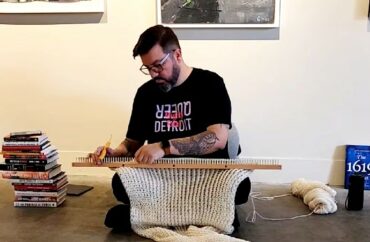
Lab spokesperson says what counts as research comes in ‘all shapes and sizes’
An art professor’s effort to fight racism with knitting is supported with a faculty research grant at Pennsylvania State University in a taxpayer-funded lab.
However, the public university did not answer questions about who is paying for the grant.
Professor Vagner Mendonça-Whitehead, (pictured) director of Penn State’s visual arts school, contracted the on-campus facility known as OriginLabs to build “large-scale” looms for his knitting project, The College Fix learned.
It involves him knitting a “house-sized structure” made of “weather-resistant” materials while listening to “anti-racism literature.”
The Pennsylvania Department of Community and Economic Development explained that Mendonça-Whitehead’s contract with the lab is covered by research funding.
“While OriginLabs staff and some supplies are partially supported by DCED funding, the Anti-Racism Knitting-loom project itself was funded by a faculty research grant used to pay the standard rates for the OriginLabs Service Bureau,” department spokesperson Justin Backover told The Fix in a recent email.
“The project initiated in November of 2023 and is still ongoing,” Backover said.
The department did not respond to a follow up from The Fix asking about the source of the grant. The Fix did not find it on Penn State’s research grant database, and the university’s media team did not respond to two emails asking about the grant in the past two weeks.
An unnamed spokesperson for OriginLabs confirmed in an email that Mendonça-Whitehead used his “own funding” for the lab contract. The spokesperson was “confident” the agreements “amount to less than $5k in income for OriginLabs.”
Both OriginLabs and the university are public, taxpayer-funded institutions.
Faculty members have used OriginLabs for research of “all shapes and sizes,” the lab official told The Fix. “We’ve laser cut parts for astrophysics faculty, 3d printed parts of medical devices, and in the case of Vagner’s project, designed and 3d printed weaving loom pegs.”
“The professor’s research does not relate to workforce development in any way, which is why none of the state or federal funding that OriginLabs has access to was used to support his activities,” the spokesperson said.
MORE: Professor knits ‘house-sized’ ‘anti-racism’ structure at Penn State
A higher education-focused thinktank questioned the artistic value of the knitted structure.
“Art is an essential means to explore the human condition and to both practice and explore our creative potential,” said Chance Layton, communications director for the National Association of Scholars. “Many of these topics can be quite sappy to most Americans.”
“I am not sure what ‘anti-racism knitting’ is or how it contributes to exploring the human condition,” Layton told The Fix, when asked about the project. “Perhaps it’ll remind us that slavery, while being a moral stain, was also an economic failure.”
Mendonça-Whitehead did not respond to two emails in the past three weeks asking about the funding and purpose behind the artwork.
The professor began his knitting projects, “Left Listening,” in December 2020 and has since knitted representations of several writings while listening to audiobooks, his personal website states.
The knitted replicas include Robin DiAngelo’s “White Fragility,” Ibram Kendi’s “How to Be an Antiracist,” Andre Henry’s “All the White Friends I Couldn’t Keep,” Nikole Hannah Jones’s “The 1619 Project,” and others, The Fix reported previously.
“My goal for a house-sized structure is to present it both as a shelter for those who need it, and as a monument for our troubled history and, sadly, present times,” Mendonça-Whitehead said, according to a university news release.
He continued, “In many ways I hope to literally suspend this past as a symbolic gesture to attempt to remove racism from our societal foundations, while serving as a reminder that we must always be on the lookout for the fragility of freedom, as the knitted material will still touch the ground.”
For his latest project, the art professor worked with the OriginLabs team “closely in both the planning and design iteration phases” to create large looms, the news release states. “Once the appropriate scales were determined, the OriginLabs team added threading to the pegs to securely fasten them to a custom-built table using specialized nuts.”
OriginLabs emphasized that it hosts a variety of clients and activities in its comments to The Fix.
“We are also a Makerspace, meant for students and community members to pursue personal and extracurricular projects; a prototyping lab that supports entrepreneurs and startups with product-based business ideas,” the spokesperson stated.
The spokesperson said the lab “hosts special events and conducts outreach with groups like the Boy and Girl Scouts and high school robotics clubs,” supports “the R&D efforts of regional businesses,” and facilitates “faculty research” like Mendonça-Whitehead’s.
The lab has received state and federal funding “in the neighborhood of $1 [million]” since it opened in March 2023, the spokesperson told The Fix. The state economic development department said it gave $55,114 to the lab in 2024.
The OriginLabs website says it offers “prototyping and fabrication space” that “allows users to design, prototype and test potential solutions for their startups or ideas.” The goal is to foster “innovation” across different academic disciplines by using “knowledge of materials, methods, and technology in order to make our lives better.”
MORE: Penn State class creates talking ‘Reproductive Justice Cyber Quilt’
IMAGE: Vagner Mendonça Whitehead/Vimeo
Like The College Fix on Facebook / Follow us on Twitter






Please join the conversation about our stories on Facebook, Twitter, Instagram, Reddit, MeWe, Rumble, Gab, Minds and Gettr.